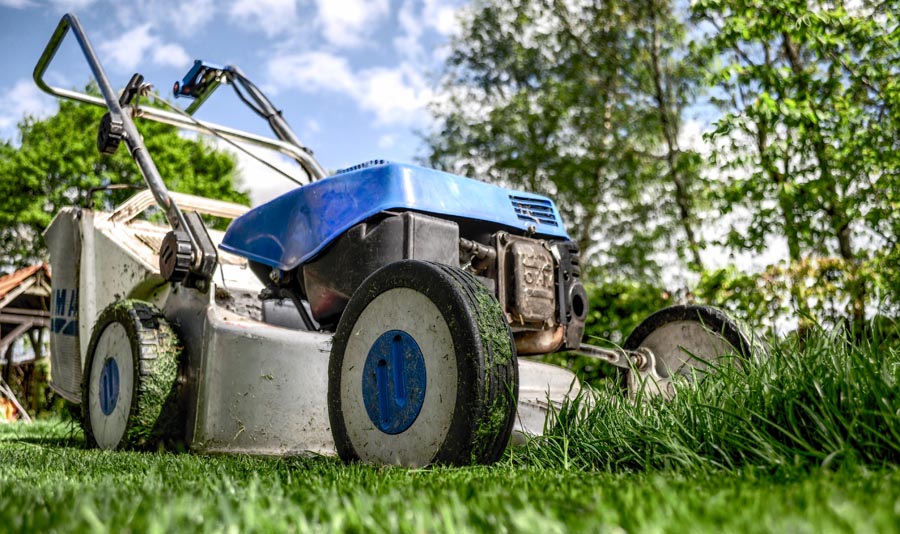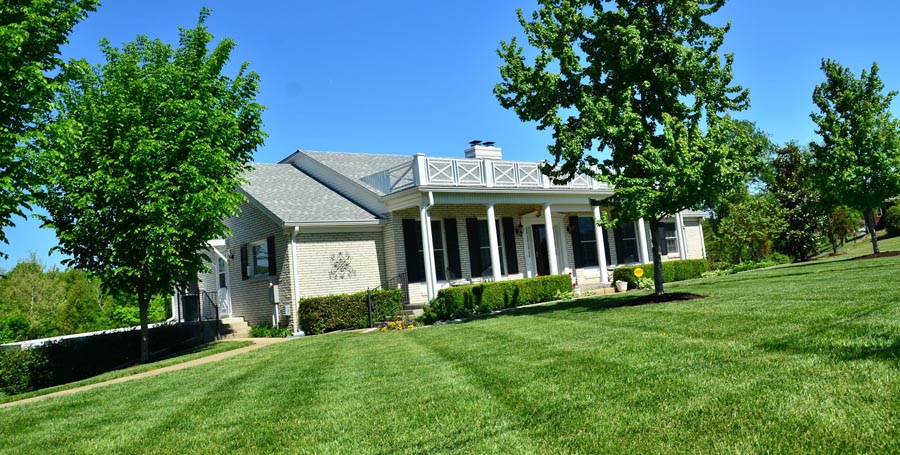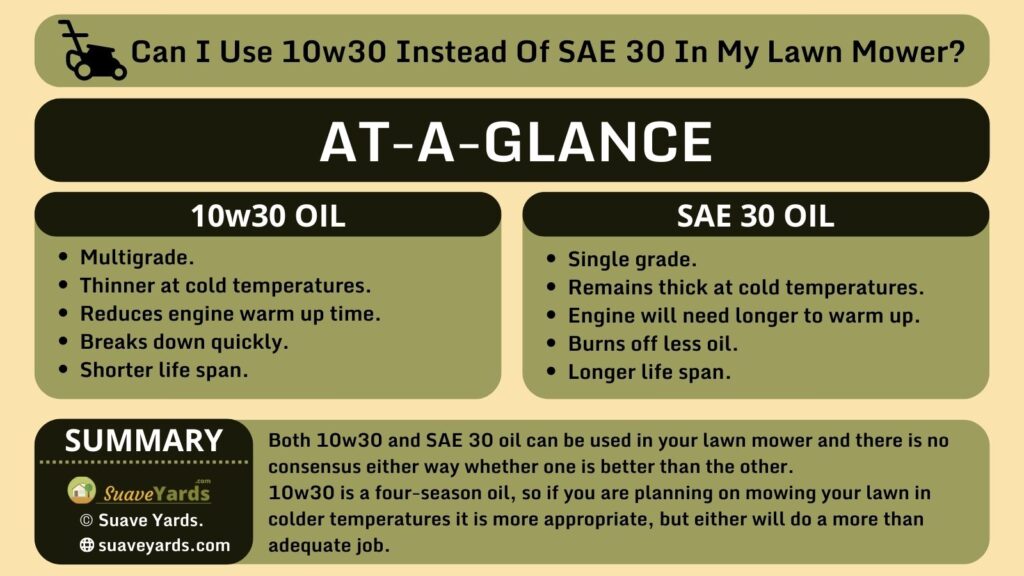
Can I use 10w30 instead of SAE 30 in my lawn mower? This is a question I have heard asked more than once.
In fact, if you are not particularly mechanically minded, like me, it is probably something you are even more concerned about.
Replacing a lawn mower isn’t cheap and if you are contemplating using a different oil to your normal choice your mind might be racing ahead to any potential damage it might do to the engine.
Stop!
Worry no more, we have answered your question here.
Without further ado, let’s get started.
Can I Use 10w30 Instead Of SAE 30 In My Lawn Mower?
Using 10w30 instead of SAE 30 won’t hurt your lawn mower in any way, and in some cases it might be more appropriate. If you plan on using your mower in freezing or near-freezing temperatures it will need much longer to warm up when using SAE30 as that remains thick at cold temperatures. 10w30 is a four-season oil suited to use in colder temperatures. Either can be safely used in a lawn mower.
Both 10w30 and SAE 30 Can Be Used in a Lawn Mower
The short answer is yes, almost without exception, you can use 10w30 instead of SAE 30 in your lawn mower.
Lawn mowers are not demanding bits of machinery and are quite well suited to either 10w30 or SAE 30.
Often you will see a particular oil recommended by the manufacturer, but often you will notice it is their own SAE 30 oil that is more expensive than a multigrade oil…
Also if you have just Googled ‘Can I use 10w30 instead of SAE 30 in my lawn mower?’ and visited some other websites and forum discussions before landing on this page (erm, excuse me, why didn’t you come straight to my site?!), you will probably have noticed something…
There is no general consensus on whether 10w30 or SAE 30 is better for your lawn mower.
Some people will argue for one, and others will argue for the other.
Either will do a perfectly adequate job.
RELATED ===> Buyers Guide: The Best Lawn Mowers on the Market
Understanding the Differences Between 10w30 and SAE 30
It might help to understand a little more about these two oils and how they differ in their composition.
Let’s look at it from two perspectives:
The Scientific Explanation
Let’s get technical here, and quote the Society of Automotive Engineers (SAE) standards for oils to be labelled 30 grade:
- Kinematic viscosity at low shear rate and a temperature of 100 °C must be be equal to or above 9.3 mm²/s and below 12.5 mm²/s. (1 millimeter²/second = 1 centistoke)
- Absolute viscosity at a shear rate of 1 (m/s)/µm* and a temperature of 150 °C must be 2.9 mPa∙s or greater. (1 millipascal∙second = 1 centipoise)
Both SAE 30 and 10w30 must conform to these standards.
Now here is what an oil must conform to, to carry the 10W label:
- Apparent viscosity at -25 °C in a standard cold-cranking simulator must be 7000 mPa∙s or less.
- Maximum pumping viscosity of 60,000 mPa∙s at -30 °C with no yield stress.
Only 10w30 needs to conform to this.
The Layman’s Explanation
For someone non-scientific like me, a more simple explanation is needed.
SAE 30 is a single-grade (single viscosity) oil, 10w30 is a multigrade (multi-viscosity) oil.
When you are looking at an oil if there is only one number (ie SAE 30), it has only one viscosity, whereas two numbers (ie 10w30) indicate two viscosities.
The key here is how these two oils perform at different temperatures.
As a single viscosity oil, SAE 30 will remain very thick at cold temperatures.
A multi-viscosity oil like 10w30 will be much thinner at cold temperatures but have a similar thickness at a normal running temperature once your lawn mower is going.
Where this comes into play is if you plan on mowing your lawn when it is still very cold (hint the ‘w’ in 10w30, stands for winter).
In that situation, with SAE 30 oil in your lawn mower, you would need to turn the mower on and leave it to warm up until the oil reaches a decent temperature and you can start mowing.
If used regularly like this it will incur some extra wear at startup, although it is fairly minimal.
RELATED ===> Can I Use 10w40 Oil In My Lawn Mower?

But in the same situation, a 10w30 oil will be thinner and need a significantly lower warm-up time before you can cut your lawn.
A 10-minute warm-up period in freezing conditions with SAE 30 will be reduced to a couple of minutes warm up with 10w30.
So I know what you are thinking!
Why would you bother using an SAE 30 oil at all?!
10w30 oil is more easily broken down in extreme heat, so an SAE 30 will burn off less oil and last longer.
SAE 30 oil won’t degrade in the same way a multi-viscosity oil will.
And also who mows their lawn in the winter?! Not many people I am sure, so the fact 10w30 performs better at freezing temperatures probably won’t be of that much importance to many.
SAE oils did actually used to be cheaper at one time too, although that no longer seems to be the case.
Once upon a time all engines ran on single-grade oils and SAE 30 was very common, multigrade oils were seen as a radical advance when they were invented in the 1960s.
10w30 and SAE 30 Compared at A Glance
| 10w30 | SAE30 | |
| Advantages | Multiviscosity so will reduce warm-up times in cold weather Cheaper | Won’t degrade as quickly and lasts longer. |
| Disadvantages | Will break down more easily and not last as long | Remains thick at cold temperatures so mower would need to time to warm up More expensive |
RELATED ===> Can You Use 2-Cycle Oil In A Lawn Mower?
Synthetic Versus Conventional Oil

Another question that crops up is whether you can use synthetic oil in a lawn mower engine.
The answer is yes you can, but I think the added expense of synthetic oils is hard to justify for a lawn mower engine.
Synthetic oils pretty much remove start-up wear from mowers, but they also burn off more easily.
As they are so much thinner they are more prone to seeping through gaps than conventional oil.
Using a cheap 10w30 oil and replacing it after the season is over will be cheaper and work just as well.
Final Thoughts

The infographic above gives you a handy overview but you most definitely can use 10w30 instead of SAE 30 in your lawn mower.
Neither will hurt your mower at all.
Where 10w30 has the edge is that it that can be used through all four seasons of the year, whereas SAE 30 is not as well suited in freezing or near-freezing conditions. That is because it remains thicker when it is cold.
So if you are planning on using your mower in very cold weather, a cheap 10w30 oil would be more suitable, just as long as you replace it after the season is over as it degrades quicker than SAE 30.
The bottom line is that lawn mower engines are not picky.
You will find some people swear by SAE 30, whereas others won’t use anything other than 10w30 and that tells you everything you need to know.
You are quite safe using either.
